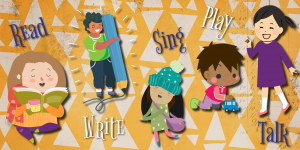
We all know that reading to young children is important. Reading:
- builds vocabulary,
- helps you and your child bond,
- builds lifelong readers,
- and even curbs behaviors like hyperactivity, aggression and attention difficulties.
But what if you have a squirmy baby, toddler, or preschooler? How do you read to a child who won’t sit still?
Establish a reading routine
Try out different times of day, like bath time. Read to a particularly energetic child in bed each night, when they already have the expectation of slowing down.
Read for short amounts of time
Follow your child’s lead. When they lose interest, don’t force them to keep listening. Try reading to them as they move around the room. They’re usually picking up more of the story than you realize.
Have fun!
Use your voice. When you read Dinosaur Kisses by David Ezra Stein, stand up and STOMP! when Dinah the dinosaur stomps. Make the story exciting.
Sing and move!
Sing a rhyming book, or choose books you can sing and move to, like If You're Happy and You Know It! by Jane Cabrera.
If You're Happy And You Know It!
Choose books with lots of brightly colored pictures
Pictures capture your child’s attention. Some good choices:
Talk about the pictures, too!
Make connections with your child’s own life. When Yuyi Morales and her son go to the library in Dreamers, talk about how you also go to the library to pick out books!
Let children pick out their own books whenever possible
If you are choosing books for your child, find ones that you truly love. Your enthusiasm for a book will spill over!
Give them a toy to fidget with while you read
A favorite toy can get ready to listen to a story, too!
Don’t give up!
And don’t take it personally if your child doesn’t take to reading right away.
Sources:
- Reading Aloud to Young Children Has Benefits for Behavior and Attention, The New York Times
- Why Reading Aloud to Kids Helps Them Thrive
- How to Read With a Squiggly Baby (or Toddler!)
-Davida, Children's Librarian, Woods Memorial Library
 Read, Write, Talk, Sing, Play!
Read, Write, Talk, Sing, Play!
Reading helps children understand how text works and positions them to increase their language and literacy skills throughout their lives.
Read more about early literacy and how you can make a difference in your child's life.

